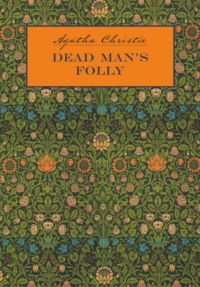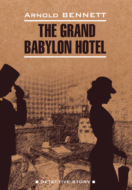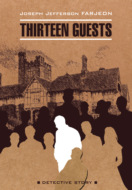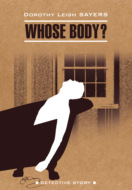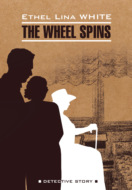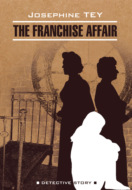Read the book: «Причуда мертвеца / Dead Man's Folly. Книга для чтения на английском языке»
To Peggy and Humphrey Trevelyan
Agatha Christie
CHAPTER 1
It was Miss Lemon, Poirot’s efficient secretary, who took the telephone call.
Laying aside her shorthand notebook, she raised the receiver and said without emphasis, ‘Trafalgar 8137.’
Hercule Poirot leaned back in his upright chair and closed his eyes. His fingers beat a meditative soft tattoo1 on the edge of the table. In his head he continued to compose the polished periods of the letter he had been dictating.
Placing her hand over the receiver, Miss Lemon asked in a low voice:
‘Will you accept a personal call from Nassecombe, Devon?’
Poirot frowned. The place meant nothing to him.
‘The name of the caller?’ he demanded cautiously.
Miss Lemon spoke into the mouthpiece.
‘Air-raid?’ she asked doubtingly. ‘Oh, yes—what was the last name again?’
Once more she turned to Hercule Poirot.
‘Mrs Ariadne Oliver.’
Hercule Poirot’s eyebrows shot up. A memory rose in his mind: windswept grey hair… an eagle profile…
He rose and replaced Miss Lemon at the telephone.
‘Hercule Poirot speaks,’ he announced grandiloquently.
‘Is that Mr Hercules Porrot speaking personally?’ the suspicious voice of the telephone operator demanded.
Poirot assured her that that was the case.
‘You’re through to Mr Porrot,’ said the voice.
Its thin reedy accents were replaced by a magnificent booming contralto which caused Poirot hastily to shift the receiver a couple of inches farther from his ear.
‘M. Poirot, is that really you?’ demanded Mrs Oliver.
‘Myself in person, Madame.’
‘This is Mrs Oliver. I don’t know if you’ll remember me—’
‘But of course I remember you, Madame. Who could forget you?’
‘Well, people do sometimes,’ said Mrs Oliver. ‘Quite often, in fact. I don’t think that I’ve got a very distinctive personality. Or perhaps it’s because I’m always doing different things to my hair. But all that’s neither here nor there. I hope I’m not interrupting you when you’re frightfully busy?’
‘No, no, you do not derange me in the least.’
‘Good gracious—I’m sure I don’t want to drive you out of your mind. The fact is, I need you.’
‘Need me?’
‘Yes, at once. Can you take an aeroplane?’
‘I do not take aeroplanes. They make me sick.’
‘They do me, too. Anyway, I don’t suppose it would be any quicker than the train really, because I think the only airport near here is Exeter which is miles away. So come by train. Twelve o’clock from Paddington to Nassecombe. You can do it nicely. You’ve got three-quarters of an hour if my watch is right—though it isn’t usually.’
‘But where are you, Madame? What is all this about?’
‘Nasse House, Nassecombe. A car or taxi will meet you at the station at Nassecombe.’
‘But why do you need me? What is all this about?’ Poirot repeated frantically.
‘Telephones are in such awkward places,’ said Mrs Oliver. ‘This one’s in the hall… People passing through and talking… I can’t really hear. But I’m expecting you. Everybody will be so thrilled. Goodbye.’
There was a sharp click as the receiver was replaced. The line hummed gently.
With a baffled air of bewilderment2, Poirot put back the receiver and murmured something under his breath. Miss Lemon sat with her pencil poised, incurious. She repeated in muted tones the final phrase of dictation before the interruption.
‘—allow me to assure you, my dear sir, that the hypothesis you have advanced…’
Poirot waved aside the advancement of the hypothesis.
‘That was Mrs Oliver,’ he said. ‘Ariadne Oliver, the detective novelist. You may have read…’ But he stopped, remembering that Miss Lemon only read improving books and regarded such frivolities as fictional crime with contempt. ‘She wants me to go down to Devonshire today, at once, in’—he glanced at the clock—‘thirty-five minutes.’
Miss Lemon raised disapproving eyebrows.
‘That will be running it rather fine,’ she said. ‘For what reason?’
‘You may well ask! She did not tell me.’
‘How very peculiar. Why not?’
‘Because,’ said Hercule Poirot thoughtfully, ‘she was afraid of being overheard. Yes, she made that quite clear.’
‘Well, really,’ said Miss Lemon, bristling in her employer’s defence. ‘The things people expect! Fancy thinking that you’d go rushing off on some wild goose chase3 like that! An important man like you! I have always noticed that these artists and writers are very unbalanced—no sense of proportion. Shall I telephone through a telegram: Regret unable leave London?’
Her hand went out to the telephone. Poirot’s voice arrested the gesture.
‘Du tout!’4 he said. ‘On the contrary. Be so kind as to summon a taxi immediately.’ He raised his voice. ‘Georges! A few necessities of toilet in my small valise. And quickly, very quickly, I have a train to catch.’
II
The train, having done one hundred and eighty-odd miles of its two hundred and twelve miles journey at top speed, puffed gently and apologetically through the last thirty and drew into Nassecombe station. Only one person alighted, Hercule Poirot. He negotiated with care a yawning gap between the step of the train and the platform and looked round him. At the far end of the train a porter was busy inside a luggage compartment. Poirot picked up his valise and walked back along the platform to the exit. He gave up his ticket and walked out through the booking-office.
A large Humber5 saloon was drawn up outside and a chauffeur in uniform came forward.
‘Mr Hercule Poirot?’ he inquired respectfully.
He took Poirot’s case from him and opened the door of the car. They drove away from the station over the railway bridge and turned down a country lane which wound between high hedges on either side. Presently the ground fell away on the right and disclosed a very beautiful river view with hills of a misty blue in the distance. The chauffeur drew into the hedge and stopped.
‘The River Helm, sir,’ he said. ‘With Dartmoor in the distance.’
It was clear that admiration was necessary. Poirot made the necessary noises, murmuring Magnifique!6 several times. Actually, Nature appealed to him very little. A well-cultivated neatly arranged kitchen garden was far more likely to bring a murmur of admiration to Poirot’s lips. Two girls passed the car, toiling slowly up the hill. They were carrying heavy rucksacks on their backs and wore shorts, with bright coloured scarves tied over their heads.
‘There is a Youth Hostel next door to us, sir,’ explained the chauffeur, who had clearly constituted himself Poirot’s guide to Devon. ‘Hoodown Park. Mr Fletcher’s place it used to be. The Youth Hostel Association bought it and it’s fairly crammed in summer time. Take in over a hundred a night, they do. They’re not allowed to stay longer than a couple of nights—then they’ve got to move on. Both sexes and mostly foreigners.’
Poirot nodded absently. He was reflecting, not for the first time, that seen from the back, shorts were becoming to very few of the female sex. He shut his eyes in pain. Why, oh why, must young women array themselves thus? Those scarlet thighs were singularly unattractive!
‘They seem heavily laden,’ he murmured.
‘Yes, sir, and it’s a long pull from the station or the bus stop. Best part of two miles to Hoodown Park.’ He hesitated. ‘If you don’t object, sir, we could give them a lift?’
‘By all means, by all means,’ said Poirot benignantly. There was he in luxury in an almost empty car and here were these two panting and perspiring young women weighed down with heavy rucksacks and without the least idea how to dress themselves so as to appear attractive to the other sex. The chauffeur started the car and came to a slow purring halt beside the two girls. Their flushed and perspiring faces were raised hopefully.
Poirot opened the door and the girls climbed in.
‘It is most kind, please,’ said one of them, a fair girl with a foreign accent. ‘It is longer way than I think, yes.’ The other girl, who had a sunburnt and deeply flushed face with bronzed chestnut curls peeping out beneath her headscarf, merely nodded her head several times, flashed her teeth, and murmured, Grazie7. The fair girl continued to talk vivaciously.
‘I to England come for two week holiday. I come from Holland. I like England very much. I have been Stratford Avon, Shakespeare Theatre and Warwick Castle. Then I have been Clovelly, now I have seen Exeter Cathedral and Torquay—very nice—I come to famous beauty spot here and tomorrow I cross river, go to Plymouth where discovery of New World was made from Plymouth Hoe.’
‘And you, signorina?’ Poirot turned to the other girl. But she only smiled and shook her curls.
‘She does not much English speak,’ said the Dutch girl kindly. ‘We both a little French speak—so we talk in train. She is coming from near Milan and has relative in England married to gentleman who keeps shop for much groceries. She has come with friend to Exeter yesterday, but friend has eat veal ham pie not good from shop in Exeter and has to stay there sick. It is not good in hot weather, the veal ham pie.’
At this point the chauffeur slowed down where the road forked. The girls got out, uttered thanks in two languages and proceeded up the left-hand road. The chauffeur laid aside for a moment his Olympian aloofness and said feelingly to Poirot:
‘It’s not only veal and ham pie—you want to be careful of Cornish pasties8 too. Put anything in a pasty they will, holiday time!’
He restarted the car and drove down the right-hand road which shortly afterwards passed into thick woods. He proceeded to give a final verdict on the occupants of Hoodown Park Youth Hostel.
‘Nice enough young women, some of ’em9, at that hostel,’ he said; ‘but it’s hard to get them to understand about trespassing. Absolutely shocking the way they trespass. Don’t seem to understand that a gentleman’s place is private here. Always coming through our woods, they are, and pretending that they don’t understand what you say to them.’ He shook his head darkly.
They went on, down a steep hill through woods, then through big iron gates, and along a drive, winding up finally in front of a big white Georgian house10 looking out over the river.
The chauffeur opened the door of the car as a tall black-haired butler appeared on the steps.
‘Mr Hercule Poirot?’ murmured the latter.
‘Yes.’
‘Mrs Oliver is expecting you, sir. You will find her down at the Battery. Allow me to show you the way.’
Poirot was directed to a winding path that led along the wood with glimpses of the river below. The path descended gradually until it came out at last on an open space, round in shape, with a low battlemented parapet. On the parapet Mrs Oliver was sitting.
She rose to meet him and several apples fell from her lap and rolled in all directions. Apples seemed to be an inescapable motif11 of meeting Mrs Oliver.
‘I can’t think why I always drop things,’ said Mrs Oliver somewhat indistinctly, since her mouth was full of apple. ‘How are you, M. Poirot?’
‘Trѐs bien, chѐre Madame12,’ replied Poirot politely. ‘And you?’
Mrs Oliver was looking somewhat different from when Poirot had last seen her, and the reason lay, as she had already hinted over the telephone, in the fact that she had once more experimented with her coiffure13. The last time Poirot had seen her, she had been adopting a windswept effect. Today, her hair, richly blued, was piled upward in a multiplicity of rather artificial little curls in a pseudo Marquise style. The Marquise effect ended at her neck; the rest of her could have been definitely labelled ‘country practical,’ consisting of a violent yolk-of-egg rough tweed coat and skirt and a rather bilious-looking mustard-coloured jumper.
‘I knew you’d come,’ said Mrs Oliver cheerfully.
‘You could not possibly have known,’ said Poirot severely.
‘Oh, yes, I did.’
‘I still ask myself why I am here.’
‘Well, I know the answer. Curiosity.’
Poirot looked at her and his eyes twinkled a little. ‘Your famous woman’s intuition,’ he said, ‘has, perhaps, for once not led you too far astray.’
‘Now, don’t laugh at my woman’s intuition. Haven’t I always spotted the murderer right away?’
Poirot was gallantly silent. Otherwise he might have replied, ‘At the fifth attempt, perhaps, and not always then!’ Instead he said, looking round him:
‘It is indeed a beautiful property that you have here.’
‘This? But it doesn’t belong to me, M. Poirot. Did you think it did? Oh, no, it belongs to some people called Stubbs.’
‘Who are they?’
‘Oh, nobody really,’ said Mrs Oliver vaguely. ‘Just rich. No, I’m down here professionally, doing a job.’
‘Ah, you are getting local colour for one of your chefs-d’oeuvre14?’
‘No, no. Just what I said. I’m doing a job. I’ve been engaged to arrange a murder.’
Poirot stared at her.
‘Oh, not a real one,’ said Mrs Oliver reassuringly. ‘There’s a big fête15 thing on tomorrow, and as a kind of novelty there’s going to be a Murder Hunt. Arranged by me. Like a Treasure Hunt, you see; only they’ve had a Treasure Hunt so often that they thought this would be a novelty. So they offered me a very substantial fee to come down and think it up. Quite fun, really—rather a change from the usual grim routine.’
‘How does it work?’
‘Well, there’ll be a Victim, of course. And Clues. And Suspects. All rather conventional—you know, the Vamp and the Blackmailer and the Young Lovers and the Sinister Butler and so on. Half a crown16 to enter and you get shown the first Clue and you’ve got to find the Victim, and the Weapon and say Whodunnit17 and the Motive. And there are Prizes.’
‘Remarkable!’ said Hercule Poirot.
‘Actually,’ said Mrs Oliver ruefully, ‘it’s all much harder to arrange than you’d think. Because you’ve got to allow for real people being quite intelligent, and in my books they needn’t be.’
‘And it is to assist you in arranging this that you have sent for me?’
Poirot did not try very hard to keep an outraged resentment out of his voice.
‘Oh, no,’ said Mrs Oliver. ‘Of course not! I’ve done all that. Everything’s all set for tomorrow. No, I wanted you for quite another reason.’
‘What reason?’
Mrs Oliver’s hands strayed upward to her head. She was just about to sweep them frenziedly through her hair in the old familiar gesture when she remembered the intricacy of her hair-do. Instead, she relieved her feelings by tugging at her ear lobes.
‘I dare say I’m a fool,’ she said. ‘But I think there’s something wrong.’
CHAPTER 2
There was a moment’s silence as Poirot stared at her. Then he asked sharply: ‘Something wrong? How?’
‘I don’t know… That’s what I want you to find out. But I’ve felt—more and more—that I was being—oh!—engineered… jockeyed along…18 Call me a fool if you like, but I can only say that if there was to be a real murder tomorrow instead of a fake one, I shouldn’t be surprised!’
Poirot stared at her and she looked back at him defiantly.
‘Very interesting,’ said Poirot.
‘I suppose you think I’m a complete fool,’ said Mrs Oliver defensively.
‘I have never thought you a fool,’ said Poirot.
‘And I know what you always say—or look—about intuition.’
‘One calls things by different names,’ said Poirot. ‘I am quite ready to believe that you have noticed something, or heard something, that has definitely aroused in you anxiety. I think it is possible that you yourself may not even know just what it is that you have seen or noticed or heard. You are aware only of the result. If I may so put it, you do not know what it is that you know. You may label that intuition if you like.’
‘It makes one feel such a fool,’ said Mrs Oliver, ruefully, ‘not to be able to be definite.’
‘We shall arrive,’ said Poirot encouragingly. ‘You say that you have had the feeling of being—how did you put it—jockeyed along? Can you explain a little more clearly what you mean by that?’
‘Well, it’s rather difficult… You see, this is my murder, so to speak. I’ve thought it out and planned it and it all fits in—dovetails19. Well, if you know anything at all about writers, you’ll know that they can’t stand suggestions. People say “Splendid, but wouldn’t it be better if so and so did so and so?” or “Wouldn’t it be a wonderful idea if the victim was A instead of B? Or the murderer turned out to be D instead of E?” I mean, one wants to say: “All right then, write it yourself if you want it that way!”’
Poirot nodded.
‘And that is what has been happening?’
‘Not quite… That sort of silly suggestion has been made, and then I’ve flared up, and they’ve given in, but have just slipped in some quite minor trivial suggestion and because I’ve made a stand over the other, I’ve accepted the triviality without noticing much.’
‘I see,’ said Poirot. ‘Yes—it is a method, that… Something rather crude and preposterous is put forward—but that is not really the point. The small minor alteration is really the objective. Is that what you mean?’
‘That’s exactly what I mean,’ said Mrs Oliver. ‘And, of course, I may be imagining it, but I don’t think I am—and none of the things seem to matter anyway. But it’s got me worried—that, and a sort of—well—atmosphere.’
‘Who has made these suggestions of alterations to you?’
‘Different people,’ said Mrs Oliver. ‘If it was just one person I’d be more sure of my ground. But it’s not just one person—although I think it is really. I mean it’s one person working through other quite unsuspecting people.’
‘Have you an idea as to who that one person is?’
Mrs Oliver shook her head.
‘It’s somebody very clever and very careful,’ she said. ‘It might be anybody.’
‘Who is there?’ asked Poirot. ‘The cast of characters must be fairly limited?’
‘Well,’ began Mrs Oliver. ‘There’s Sir George Stubbs who owns this place. Rich and plebeian20 and frightfully stupid outside business, I should think, but probably dead sharp in it. And there’s Lady Stubbs—Hattie—about twenty years younger than he is, rather beautiful, but dumb as a fish—in fact, I think she’s definitely halfwitted. Married him for his money, of course, and doesn’t think about anything but clothes and jewels. Then there’s Michael Weyman—he’s an architect, quite young, and good-looking in a craggy kind of artistic way. He’s designing a tennis pavilion for Sir George and repairing the Folly.’
‘Folly? What is that—a masquerade?’
‘No, it’s architectural. One of those little sort of temple things, white, with columns. You’ve probably seen them at Kew. Then there’s Miss Brewis, she’s a sort of secretary housekeeper, who runs things and writes letters—very grim and efficient. And then there are the people round about who come in and help. A young married couple who have taken a cottage down by the river—Alec Legge and his wife Sally. And Captain Warburton, who’s the Mastertons’ agent. And the Mastertons, of course, and old Mrs Folliat who lives in what used to be the lodge. Her husband’s people owned Nasse originally. But they’ve died out, or been killed in wars, and there were lots of death duties21 so the last heir sold the place.’
Poirot considered this list of characters, but at the moment they were only names to him. He returned to the main issue.
‘Whose idea was the Murder Hunt?’
‘Mrs Masterton’s, I think. She’s the local M.P.’s wife, very good at organizing. It was she who persuaded Sir George to have the fête here. You see the place has been empty for so many years that she thinks people will be keen to pay and come in to see it.’
‘That all seems straightforward enough,’ said Poirot.
‘It all seems straightforward,’ said Mrs Oliver obstinately; ‘but it isn’t. I tell you, M. Poirot, there’s something wrong.’
Poirot looked at Mrs Oliver and Mrs Oliver looked back at Poirot.
‘How have you accounted for my presence here? For your summons to me?’ Poirot asked.
‘That was easy,’ said Mrs Oliver. ‘You’re to give away the prizes for the Murder Hunt. Everybody’s awfully thrilled. I said I knew you, and could probably persuade you to come and that I was sure your name would be a terrific draw—as, of course, it will be,’ Mrs Oliver added tactfully.
‘And the suggestion was accepted—without demur?’
‘I tell you, everybody was thrilled.’
Mrs Oliver thought it unnecessary to mention that amongst the younger generation one or two had asked ‘Who is Hercule Poirot?’
‘Everybody? Nobody spoke against the idea?’
Mrs Oliver shook her head.
‘That is a pity,’ said Hercule Poirot.
‘You mean it might have given us a line?’
‘A would-be criminal could hardly be expected to welcome my presence.’
‘I suppose you think I’ve imagined the whole thing,’ said Mrs Oliver ruefully. ‘I must admit that until I started talking to you I hadn’t realized how very little I’ve got to go upon.’
‘Calm yourself,’ said Poirot kindly. ‘I am intrigued and interested. Where do we begin?’
Mrs Oliver glanced at her watch.
‘It’s just tea-time. We’ll go back to the house and then you can meet everybody.’
She took a different path from the one by which Poirot had come. This one seemed to lead in the opposite direction.
‘We pass by the boathouse this way,’ Mrs Oliver explained.
As she spoke the boathouse came into view. It jutted out on to the river and was a picturesque thatched affair.22
‘That’s where the Body’s going to be,’ said Mrs Oliver. ‘The body for the Murder Hunt, I mean.’
‘And who is going to be killed?’
‘Oh, a girl hiker, who is really the Yugoslavian first wife of a young Atom Scientist,’ said Mrs Oliver glibly.
Poirot blinked.
‘Of course it looks as though the Atom Scientist had killed her—but naturally it’s not as simple as that.’
‘Naturally not—since you are concerned…’
Mrs Oliver accepted the compliment with a wave of the hand.
‘Actually,’ she said, ‘she’s killed by the Country Squire23—and the motive is really rather ingenious—I don’t believe many people will get it—though there’s a perfectly clear pointer in the fifth clue.’
Poirot abandoned the subtleties of Mrs Oliver’s plot to ask a practical question:
‘But how do you arrange for a suitable body?’
‘Girl Guide,’ said Mrs Oliver. ‘Sally Legge was going to be it—but now they want her to dress up in a turban and do the fortune telling24. So it’s a Girl Guide called Marlene Tucker. Rather dumb and sniffs,25’ she added in an explanatory manner. ‘It’s quite easy—just peasant scarves and a rucksack—and all she has to do when she hears someone coming is to flop down on the floor and arrange the cord round her neck. Rather dull for the poor kid—just sticking inside that boathouse until she’s found, but I’ve arranged for her to have a nice bundle of comics—there’s a clue to the murderer scribbled on one of them as a matter of fact—so it all works in.’
‘Your ingenuity leaves me spellbound! The things you think of!’
‘It’s never difficult to think of things,’ said Mrs Oliver. ‘The trouble is that you think of too many, and then it all becomes too complicated, so you have to relinquish some of them and that is rather agony. We go up this way now.’
They started up a steep zig-zagging path that led them back along the river at a higher level. At a twist through the trees they came out on a space surmounted by a small white pilastered temple. Standing back and frowning at it was a young man wearing dilapidated flannel trousers and a shirt of rather virulent green. He spun round towards them.
‘Mr Michael Weyman, M. Hercule Poirot,’ said Mrs Oliver.
The young man acknowledged the introduction with a careless nod.
‘Extraordinary,’ he said bitterly, ‘the places people put things! This thing here, for instance. Put up only about a year ago—quite nice of its kind and quite in keeping with the period of the house. But why here? These things were meant to be seen—“situated on an eminence”—that’s how they phrased it—with a nice grassy approach and daffodils, et cetera. But here’s this poor little devil, stuck away in the midst of trees—not visible from anywhere—you’d have to cut down about twenty trees before you’d even see it from the river.’
‘Perhaps there wasn’t any other place,’ said Mrs Oliver.
Michael Weyman snorted.
‘Top of that grassy bank by the house—perfect natural setting. But no, these tycoon fellows are all the same—no artistic sense. Has a fancy for a “Folly,” as he calls it, orders one. Looks round for somewhere to put it. Then, I understand, a big oak tree crashes down in a gale. Leaves a nasty scar. “Oh, we’ll tidy the place up by putting a Folly there,” says the silly ass. That’s all they ever think about, these rich city fellows, tidying up! I wonder he hasn’t put beds of red geraniums and calceolarias all round the house! A man like that shouldn’t be allowed to own a place like this!’
He sounded heated.
‘This young man,’ Poirot observed to himself, ‘assuredly does not like Sir George Stubbs.’
‘It’s bedded down in concrete,’ said Weyman. ‘And there’s loose soil underneath—so it’s subsided. Cracked all up here—it will be dangerous soon… Better pull the whole thing down and re-erect it on the top of the bank near the house. That’s my advice, but the obstinate old fool won’t hear of it.’
‘What about the tennis pavilion?’ asked Mrs Oliver.
Gloom settled even more deeply on the young man. ‘He wants a kind of Chinese pagoda,26’ he said, with a groan. ‘Dragons if you please! Just because Lady Stubbs fancies herself in Chinese coolie hats27. Who’d be an architect? Anyone who wants something decent built hasn’t got the money, and those who have the money want something too utterly goddam awful!’
‘You have my commiserations,’ said Poirot gravely.
‘George Stubbs,’ said the architect scornfully. ‘Who does he think he is? Dug himself into some cushy Admiralty job in the safe depths of Wales during the war—and grows a beard to suggest he saw active naval service on convoy duty—or that’s what they say. Stinking with money—absolutely stinking!’
‘Well, you architects have got to have someone who’s got money to spend, or you’d never have a job,’ Mrs Oliver pointed out reasonably enough. She moved on towards the house and Poirot and the dispirited architect prepared to follow her.
‘These tycoons,’ said the latter bitterly, ‘can’t understand first principles.’ He delivered a final kick to the lopsided Folly. ‘If the foundations are rotten—everything’s rotten.’
‘It is profound what you say there,’ said Poirot. ‘Yes, it is profound.’
The path they were following came out from the trees and the house showed white and beautiful before them in its setting of dark trees rising up behind it.
‘It is of a veritable beauty, yes,’ murmured Poirot.
‘He wants to build a billiard room on,’ said Mr Weyman venomously.
On the bank below them a small elderly lady was busy with secateurs on a clump of shrubs. She climbed up to greet them, panting slightly.
‘Everything neglected for years,’ she said. ‘And so difficult nowadays to get a man who understands shrubs. This hillside should be a blaze of colour in March and April, but very disappointing this year—all this dead wood ought to have been cut away last autumn—’
‘M. Hercule Poirot, Mrs Folliat,’ said Mrs Oliver.
The elderly lady beamed.
‘So this is the great M. Poirot! It is kind of you to come and help us tomorrow. This clever lady here has thought out a most puzzling problem—it will be such a novelty.’
Poirot was faintly puzzled by the graciousness of the little lady’s manner. She might, he thought, have been his hostess.
He said politely:
‘Mrs Oliver is an old friend of mine. I was delighted to be able to respond to her request. This is indeed a beautiful spot, and what a superb and noble mansion.’
Mrs Folliat nodded in a matter-of-fact manner.
‘Yes. It was built by my husband’s great-grandfather in 1790. There was an Elizabethan house28 previously. It fell into disrepair29 and burned down in about 1700. Our family has lived here since 1598.’
Her voice was calm and matter of fact. Poirot looked at her with closer attention. He saw a very small and compact little person, dressed in shabby tweeds. The most noticeable feature about her was her clear china-blue eyes30. Her grey hair was closely confined by a hairnet. Though obviously careless of her appearance, she had that indefinable air of being someone which is so hard to explain.
As they walked together towards the house, Poirot said diffidently, ‘It must be hard for you to have strangers living here.’
There was a moment’s pause before Mrs Folliat answered. Her voice was clear and precise and curiously devoid of emotion.
‘So many things are hard, M. Poirot,’ she said.
